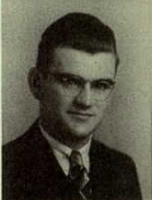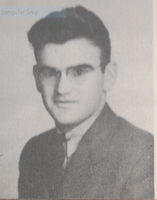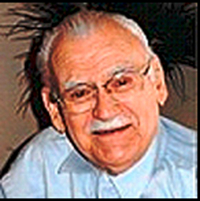Skip to content
James Richard Ketchum
Jeremy Anderson2020-10-29T15:50:43-05:00
- Name: James Richard Ketchum
- Location of Birth: Estherville, Iowa
- Date of Birth: April 13, 1922
- Date of Death: April 3, 2007
- Parents: Claude Ketchum & Gertrude (Bryan) Ketchum
- High School and Class: 1940 Greenway High School, Coleraine, Minnesota
- College: 1942 Itasca Junior College, Coleraine, Minnesota
- Highest Rank:
- Branch: Navy
- Other Branch:
- Date Sworn In:
- Place Sworn In:
- Date of Discharge:
- Place of Discharge:
-
- Military Awards:
- Military Highlights:
WW II Draft Registration Cards – 10/16/1940 – 03/31/1947
State: Minnesota
Name: James Richard Ketchum
Race: White
Age: 20
Birth Date: April 13, 1922
Birth Place: Estherville, Iowa, USA
Residence Place: Lawrence Lake Township, Itasca, Minnesota, USA
Registration Date: June 30, 1942
Employer: Oliver Mining Co., Coleraine, Minnesota
Weight: 175
Height: 5-11
Complexion: Dark
Eye Color: Brown
Hair Color: Black
Next of Kin: Mrs. Claude Ketchum, Rt. 2, Bovey, Minnesota
Newspaper article: Bovey Press, Bovey, Minnesota - April 10, 1944 – “My Dear Mrs. Dargan: Thanks ever so much for the card. It came on Easter Sunday and so I count it as an Easter card also. Naval life hasn’t been as bad as my fears led me to believe, altho one is a little confused at first. Buildings aren’t buildings; they’re ships. The front of a building is the bow; the rear, the stern. The walls are bulkheads; windows are ports; lavatories are heads; halls are companionways; posts are stanchions; and floors are decks. We had an old salt bring us over. When he gave us directions, they were incomprehensible. He sounded like he was speaking doubletalk with his mouth full of marbles. However, I, for one, have caught on. I fear that when I come home I’ll have to learn to talk “civilian.” Our company will graduate the ninth of May. At least that’s the current schedule. Orders are made and countermanded daily, so we aren’t quite sure. Radio technicians, however, do not get leave after their boot-training is completed, so we will go right on to school in Chicago. Pre-radio school in Chicago runs for four months. After that, we may get leave. Those who complete radio training at Chicago will go to a radar school at San Francisco. If we can complete that training, we become petty officers, second class. Our company is composed of 134 men from 29 states, the District of Columbia and ‘Brooklyn’. We have as many dialects and accents as a League of Nations. We manage to understand each other, altho three Texans refuse to say they speak English. A very touching and heart-warming thing happened Easter. An old lady in Grand Rapids, Michigan, sent an Easter card to every company at Great Lakes. We heard that she has sent a card to each company for several years. She signed herself as ‘A Mother of a boy in the Navy’. The company wrote a short note of appreciation and all 134 of us signed it. The card from someone whom no one knew added a bit of meaning to the Easter spirit. And your card did its bit. It meant a lot more, too, because it was from home. Since I’ve met no one from home or know of no one here, they mean a lot. Thanks a lot again. Sincerely, James Ketchum.”
Newspaper article: Bovey Press, Bovey, Minnesota – May 26, 1944 – “James Richard Ketchum, 22, son of Mr. and Mrs. Claude B. Ketchum, was enrolled recently in a month’s radio refresher course at the Pre-Radio Naval Training school located at the Hugh Manley School, Chicago, Ill. The Blue jacket’s radio ability was discovered in a series of aptitude tests given during his recruit training. The short course includes the basic principles of electricity, algebra and slide-rule fundamentals. Successful completion of the short course sends the Blue jacket on to an advanced radio school where he is eligible to win a petty officer rating before being sent on active duty.”
Newspaper article: Bovey Press, Bovey, Minnesota – June 26, 1944 – “June 10, 1944. Dear Friends: This letter has been long in coming. I can thank heaven the Press hasn’t been that long in coming. It is going to be a greater blessing than ever now that I’m half a continent away from home. Speaking of home, the naval station here reminds me of Mrs. Bluntach’s pasture. I don’t mean to run down naval stations, but when it’s put in a grove of pine, on sandy soil with sparse grass – the resemblance is startling. There is only one discrepancy: the needles of the pines are about eight to fourteen inches long, and form more plumy tufts than the Norway pines. We have no mosquitoes either – and I don’t miss them one bit. The school is located about one mile from the Gulf and not more than 20 feet above sea level. Altho it is rather warm and humid during the day, it cools off in the evening so that studying and sleeping is possible. For instance, this evening the temperature is down to about 55, which is very cold, we are told. A large, dark, gloomy cloud bank is coming in from the Gulf, too, and no doubt it will rain cobblestones and pine stumps tonite. The peach crop is just ripening. We had the chance to swipe some out of a peach grove which happened to be along a siding where we stopped. We enjoyed them immensely until the lieutenant caught us. We were saved by the owner’s daughter, who cordially invited us all in the grove and personally offered a handful of luscious peaches. The lieutenant thought that it might not be such a bad idea – just so no one else was in the orchard with us. We were on a secret mission, it seems, and the Japs might want to disrupt the training of radio techs by derailing our train. Incidentally, the owner’s daughter was O.K. – a real Southern belle – but why in the name of God doesn’t she wear shoes? The magnolias have just finished blooming. Once in a while a late blossom still hangs on the trees of rich, waxy foliage. I don’t blame the South for being proud of their magnolias for they are beautiful. And the same goes for the azaleas. There are whole rows of them along the boulevards in Gulfport. With the rows of palms and palmettos, they form a handsome street. But there is a lot of country that isn’t worth a tinker’s damn. The plantation mansions which appear on the postcards aren’t much in evidence. Most of the people – especially the Negroes and poor whites – live in shacks. As we rode in the train, we could see into any number of these shacks. About 30 percent were one room, the rest were separated into a sleeping and living space. The majority of the summer cabins which you have on the lakes in Balsam and Pokegama, are much more securely and substantially constructed and much more suitable for human habitation. The climate will permit a more open type of living I suppose, but I’d prefer security from insects, rain, wind, and vermin. Perhaps as part payment and to help them forget the other misfortunes, the Southerners can grow a profusion of lilies, caladiums, foliage and flowers of all types. They are interesting to sketch and I hope to make some water color sketches before I leave. This is our first Saturday here and, due to a whim of the skipper, we must stay aboard our first week end. Next week end, several of us plan on going to New Orleans. It’s out-of-bounds, but getting a pass is only routine. Getting there is a trick, tho. One must buy half a round-trip ticket from some old hand, and when in New Orleans, buy another round-trip ticket. The catch is that we must get a chit for a ticket at the base, then buy the ticket. With half a round-trip ticket, we can walk right into the train. Even in New Orleans, liberty is a tough situation. Thanks again for the Press, it’s a grand link with home. Sincerely, James Ketchum.”
Newspaper article: Bovey Press, Bovey, Minnesota – August 25, 1944 – “July 6, 1944. Dear Mr. Wagner: You chose the wrong profession; you should be a writer. Why waste your precious hours among musty law books when you might lead the leisurely dissolute life of a literary giant? Come, Mr. Wagner, when will you realize your potentialities? Seriously, it was grand to hear from someone back home. All the little talk about planting gardens, setting out strawberry plants, seeding the back “40”, etc., makes home seem a little closer, even if I’m 1500 miles away. If we get paid this week, several of us plan on going fishing in the Gulf. It will be a thrill to wet our lines in salt water, and maybe pull in a snapper. The tarpon aren’t running, the natives tell us, so snappers are the only fish which furnish any sport. Quite a few crabs are gathered along the shores around here. The Negroes sweep the beaches and surf for all types several times a day. Gulfport has several world-famed seafood places, but I have a holy horror of seafood for some reason, and haven’t ventured into these places. Saturday before last, three of us hitched our way into New Orleans. This is the most interesting city I’ve been in, especially the Vieux Carre or French Quarters. The whole city has not got the bustling commercial atmosphere of Northern cities; rather it’s an easy, slow, but determined way of life. The French Quarters, however, is completely antique. During the day, tourists swarm over the place, rummaging thru hundreds of antique stores, buying manufactured antiques, scratching their initials in crumbling plaster, drinking at the Old Absinthe House and eating at Antoine’s. It’s a romantic place, wisteria drapes over elaborate iron balconies, and one can catch glimpses of patios with fountains of goldfish, and tubs of potted plants, where people can retreat from the noon-day sun. And then there are crowds of precocious little brats who wander the streets, alleys is more apt, screaming and chattering in voluble French. There’s nothing like it. After dark, the Quarter pulses with life. Crowds roam the little streets so that vehicular traffic is detoured; everyone is looking for floor shows and bars. Friday is comprehensive day, when we find out whether we continue in radio tech. training or draw some even more ghastly fate. Consequently, everyone is studying with much zeal – and that’s what I had better do. Thanks again, it was swell to hear from you. Say hello to Dr. and Mrs. Baich. As soon as I gather some good jokes, I’ll write them. Sincerely, Ketch (James Ketchum)”
- Wars Involved:
World War II
- MIA / POW:
- Civilian Life:
Jim Ketchum married Evelyn Baum in 1951 in Ohio. He was an engineer with Sperry Univac for many years. He was a 57-year Mason member holding dual membership with Clifton Lodge #664, Lakewood, Ohio, and Lebanon Lodge #346 AF & AM, Shakopee, Minnesota.
Jim died in Burnsville, Minnesota. He is survived by his daughter Rae Ann. He was preceded in death by is wife, Evelyn M.; his parents; and his sister, Betty Nordine.
- Tribal Affiliation(s):
Page load link




